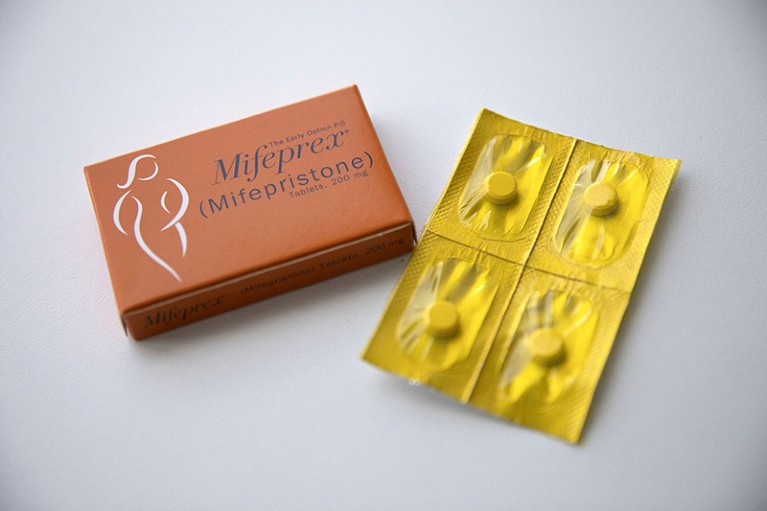Mifepristone is used in combination with misoprostol to terminate a pregnancy.Credit: Erin Hooley/Chicago Tribune/Tribune News Service via Getty
Executives of more than 500 pharmaceutical companies have signed a letter condemning a federal judge’s decision to overturn the approval of the abortion drug mifepristone by the US Food and Drug Administration (FDA). The document supports the FDA’s authority to regulate medicines and calls for the reversal of the ruling. By ignoring “decades of scientific evidence”, the decision creates a dangerous precedent that puts the approval of all drugs at risk, the letter says.
“Adding regulatory uncertainty to the already inherently risky work of discovering and developing new medicines will likely have the effect of reducing incentives for investment, endangering the innovation that characterizes our industry,” the signatories write. Among them are executives of prominent drug companies including Pfizer, AbbVie and Bristol Myers Squibb.
Approval overturned
Endorsed by the American College of Obstetricians and Gynecologists (ACOG), the combination of mifepristone and misoprostol is the most commonly prescribed regimen for medication abortion in the United States. But on 7 April, judge Matthew Kacsmaryk, in the US District Court for the Northern District of Texas, ruled in favour of a group of anti-abortion organizations and physicians who sought to overturn the FDA’s approval of mifepristone in 2000, arguing that the drug is unsafe.
US lawsuit threatens access to abortion drug: the science behind the case
The pharma executives’ letter says that the drug carries a very low risk of major complications. According to a 2013 review in the journal Contraception, only 0.3% of people who took mifepristone combined with misoprostol were hospitalized1.
Rachel King, interim president and chief executive of BIO, the largest trade association representing biotechnology companies, also released a statement criticizing Kacsmaryk’s decision. “The preliminary ruling by a federal judge in Texas is an assault on science and the FDA’s long-standing role as the authority to make decisions on the safety and efficacy of medicines,” the statement says.
“While PhRMA and our members are not a party to this litigation, our focus is on ensuring a policy environment that supports the agency’s ability to regulate and provides access to FDA-approved medicines,” said the Pharmaceutical Research and Manufacturers of America (PhRMA), which represents the largest biopharmaceutical research companies in the United States, in a statement sent to journalists on request.
‘Ideological attacks’
Kacsmaryk’s ruling is set to take effect on 14 April. Both the US Department of Justice and Danco Laboratories, the maker of the branded version of mifepristone, have filed appeals and asked for the temporary suspension of the decision.
“If this ruling were to stand, then there will be virtually no prescription, approved by the FDA, that would be safe from these kinds of political, ideological attacks,” said US President Joe Biden in a statement.
During a media briefing on 10 April, Jessica Ellsworth, the lead counsel for Danco in this case, said she’s hopeful that either the appeals court or the Supreme Court will suspend the decision before 14 April.
The US Supreme Court abortion verdict is a tragedy. This is how research organizations can help
If this doesn’t happen in time, “mifepristone will become an unapproved drug”, says Greer Donley, an abortion-law specialist at the University of Pittsburgh in Pennsylvania. But what this would mean in practice is not yet clear. “No court has ever overturned a long-standing drug approval. So we are in unprecedented territory,” Ellsworth says.
Legal specialists argue that, if the judge’s decision goes into effect, the FDA could choose not to enforce it. “The FDA can recognize that mifepristone is an unapproved drug, but not actually enforce the statute against anybody who is technically violating the act,” says Donley. This practice is not unusual, because the FDA doesn’t have the capacity to go after every single person or institution that violates food and drug laws, she notes.
This strategy would be especially suitable in this situation because of another court decision issued on 7 April that directly contradicts Kacsmaryk’s orders. In a separate case, a group of 17 states and Washington DC sued the FDA to ease certain restrictions on mifepristone access. Judge Thomas Rice, in the US District Court for the Eastern District of Washington, blocked the FDA from making any changes to reduce the availability of mifepristone in those states. Donley says that the only way the FDA could comply with both conflicting orders would be by exercising its enforcement discretion.
Any prediction of what will happen is speculative at this point. “This is pretty unprecedented, and could have pretty broad impacts for the entire pharmaceutical industry. So we’ll have to wait and see how it plays out in the appeals courts,” says Donley.








More News
US funders to tighten oversight of controversial ‘gain-of-function’ research
Bird flu in US cows: where will it end?
Daily briefing: Why exercise is good for us